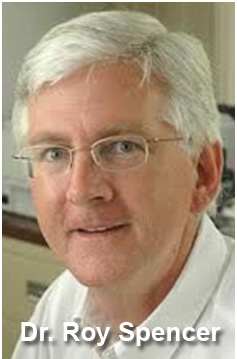There was potentially big news in the global warming ecosystem last week, as NASA researcher Dr. Roy Spencer published a paper that claimed to show "a huge discrepancy" between the real levels of atmospheric heating and forecasts by the United Nations and other groups.
That would be big news indeed if true, as current predictions relative to the potential damage that environmental groups believe is likely from global warming would have to be scaled back substantially, meaning CO2 mitigation programs such as cap and trade or carbon taxes could be downsized back or slowed down substantially.
However, some on the other side of the debate soon made countercharges, saying that Spencer is a long-time global warming skeptic, and that his model is "unrealistic", "flawed", and "incorrect."
Spencer along with Danny Braswell authored a paper ("On the Misdiagnosis of Surface Temperature Feedbacks from Variations in Earth’s Radiant Energy Balance") in the peer-reviewed scientific journal Remote Sensing. The paper argues that NASA satellite data from the years 2000 through 2011 show the Earth’s atmosphere is allowing far more heat to be released into space than "alarmist" computer models have predicted, and that as a result far less future global warming will occur than United Nations computer models estimate.
Spencer says the data supports other prior studies showing increases in atmospheric carbon dioxide trap far less heat than many on the alarmist side have claimed. The tendency of greenhouse gases to trap heat so that it cannot escape the atmosphere of course is at the very heart of global warming science.
Dr. Spencer, who also serves as a climatologist at the University of Alabama in addition to work for NASA on the space agency’s temperature-monitoring satellites, says that "Satellite observations suggest there is much more energy lost to space during and after warming than the climate models show," and that "There is a huge discrepancy between the data and the forecasts that is especially big over the oceans."
The earth is "radiating" far more heat than most existing models recognize, Spencer says. It is believed that his research, which reads like the detailed academic paper that it is, is the first study to examine the data from NASA satellites for climate change study.
Spencer has written in the past that he believes hotter air produces more clouds, which then in turn have a cooling effect on the Earth, providing a counterforce to warming factors. He believes there is some warming going on, but that it is occurring at a much lower rate than most of the global warming community sees it. That minor warming is an "unsolved problem," he says, but the slow pace means the world does not need to be "alarmist" about it.
Of course, the rebuttals on the paper from global warming circles were fast and intense.
 "The basic material in the paper has very basic shortcomings because no statistical significance of results, error bars or uncertainties are given either in the figures or discussed in the text. Moreover the description of methods of what was done is not sufficient to be able to replicate results," writes Kevin Trenberth, a senior scientist at the National Center for Atmospheric Research, on RealClimate.com. "The basic material in the paper has very basic shortcomings because no statistical significance of results, error bars or uncertainties are given either in the figures or discussed in the text. Moreover the description of methods of what was done is not sufficient to be able to replicate results," writes Kevin Trenberth, a senior scientist at the National Center for Atmospheric Research, on RealClimate.com.
Some critics are noting that Remote Sensing is more of a geography journal than one focused on climate science, and that as a result the peer review process was lacking for this provocative topic. Others are noting that Spencer has also been involved in work related to "intelligent design" for the origins of the universe, suggesting someone involved in those theories should be generally suspect as a researcher.
A few climate scientists at least offered balanced views.
"It’s a simplistic theory and we will need to look very closely at these measurements as he is far from proving conclusively that this is the cause," said Bob Ward of the Grantham Research Institute on Climate Change and the Environment at the London School of Economics.
Ward added that "‘He [Spencer] has taken these measurements over a very short time during which the Earth has not heated as much as it did in the late 1990s, and scientists expect this heating to resume.
Of course, one study on either side of the debate proves nothing. We hope Spencer's work does drive related studies to test the theories validity, given the stakes.
What do you think of this new study downgrading the impact of global warming? Are climate scientists giving it a fair shake? Let us know your thoughts at the Feedback button below.

TheGreenSupplyChain.com is now Twittering! Follow us at www.twitter.com/greenscm |